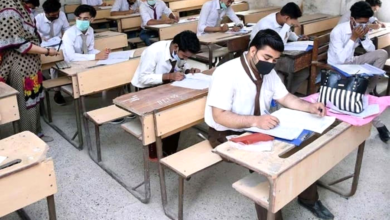Record Rainfall Triggers Deadly Urban Flooding in Karachi, Schools Closed Amid Crisis

KARACHI, Pakistan -Pakistan’s largest city is grappling with a severe flooding crisis as record-breaking monsoon rains have claimed at least 10 lives and forced authorities to declare a citywide emergency, closing schools and offices across the metropolitan area.
The devastating downpour, which began on August 19, has brought Karachi to a standstill with floodwaters reaching up to three feet in some areas and overwhelming the city’s drainage infrastructure. The Sindh government declared Wednesday a public holiday and ordered all educational institutions to remain closed to protect students from flooding.
Unprecedented Rainfall Overwhelms Infrastructure
The scale of precipitation has been extraordinary, with multiple areas recording rainfall that far exceeds monthly averages. Gulshan-e-Hadeed recorded the highest totals at 145 mm, followed by Airport Old Area at 138 mm and Keamari at 137 mm. For comparison, Karachi’s average August rainfall typically ranges between 85 and 104 mm for the entire month.
The city’s drainage system, designed to handle only 40 mm of rainfall, was completely overwhelmed by the torrential downpour, leading to widespread urban flooding across major districts, including Gulistan-e-Jauhar, Mehmoodabad, and Malir.
Rising Death Toll and Infrastructure Collapse
The flooding has claimed between 7 and 11 lives, according to various official reports, with most casualties resulting from wall collapses and electrocution incidents. The most devastating incident occurred in Gulistan-e-Jauhar Block 12, where four family members were killed in a wall collapse, including two children aged 3 and 4.
Power outages have affected over 550 feeders out of 2,100 total, leaving hundreds of thousands without electricity. K-Electric has been unable to access flooded areas for repairs due to safety concerns, with some districts experiencing power cuts for over 24 hours.
Major roads, including Shahrah-e-Faisal, University Road, and areas near the Governor House, have been completely submerged, bringing traffic to a complete halt during peak hours.
Government Response and Emergency Measures
Sindh Chief Minister Murad Ali Shah has coordinated emergency response efforts, while Mayor Murtaza Wahab declared a rain emergency and cancelled all municipal staff leave.
Emergency coordination centers have been established, with 120 suction vehicles deployed in low-lying areas and the Provincial Disaster Management Authority activated. Rescue 1122 has positioned emergency teams at 15 strategic locations along major highways.
“There are chances of severe rains in Sindh, especially in Karachi, with chances of urban flooding,” Local Government Minister Saeed Ghani stated, emphasizing that all possible arrangements have been made to handle the crisis.
Climate Change Connection
The current rainfall represents 137% above historical norms for August, fitting a broader pattern of intensifying climate extremes affecting Pakistan. Climate scientists note that such extreme events are becoming more frequent and intense due to climate change.
Pakistan ranks as the world’s 8th most climate-vulnerable country, with traditional monsoon patterns becoming increasingly unpredictable. The current crisis follows devastating floods in 2020 and 2022 that highlighted the country’s growing vulnerability to extreme weather events.
Continued Weather Warnings
The Pakistan Meteorological Department has issued warnings for continued heavy rainfall through August 23, with meteorologists predicting more intense downpours in the coming days.
The National Disaster Management Authority has issued urgent warnings covering multiple Sindh districts, advising citizens to avoid low-lying areas and stay away from electrical installations.
The immediate forecast shows continued thundery showers with temperatures ranging from 27°C to 33°C, as two circulation patterns over the North Arabian Sea continue to drive the weather system affecting southern Pakistan.
As Karachi struggles to cope with the immediate crisis, the broader implications of increasingly severe monsoon events raise urgent questions about urban planning and climate adaptation strategies for Pakistan’s economic capital, home to over 15 million people.











